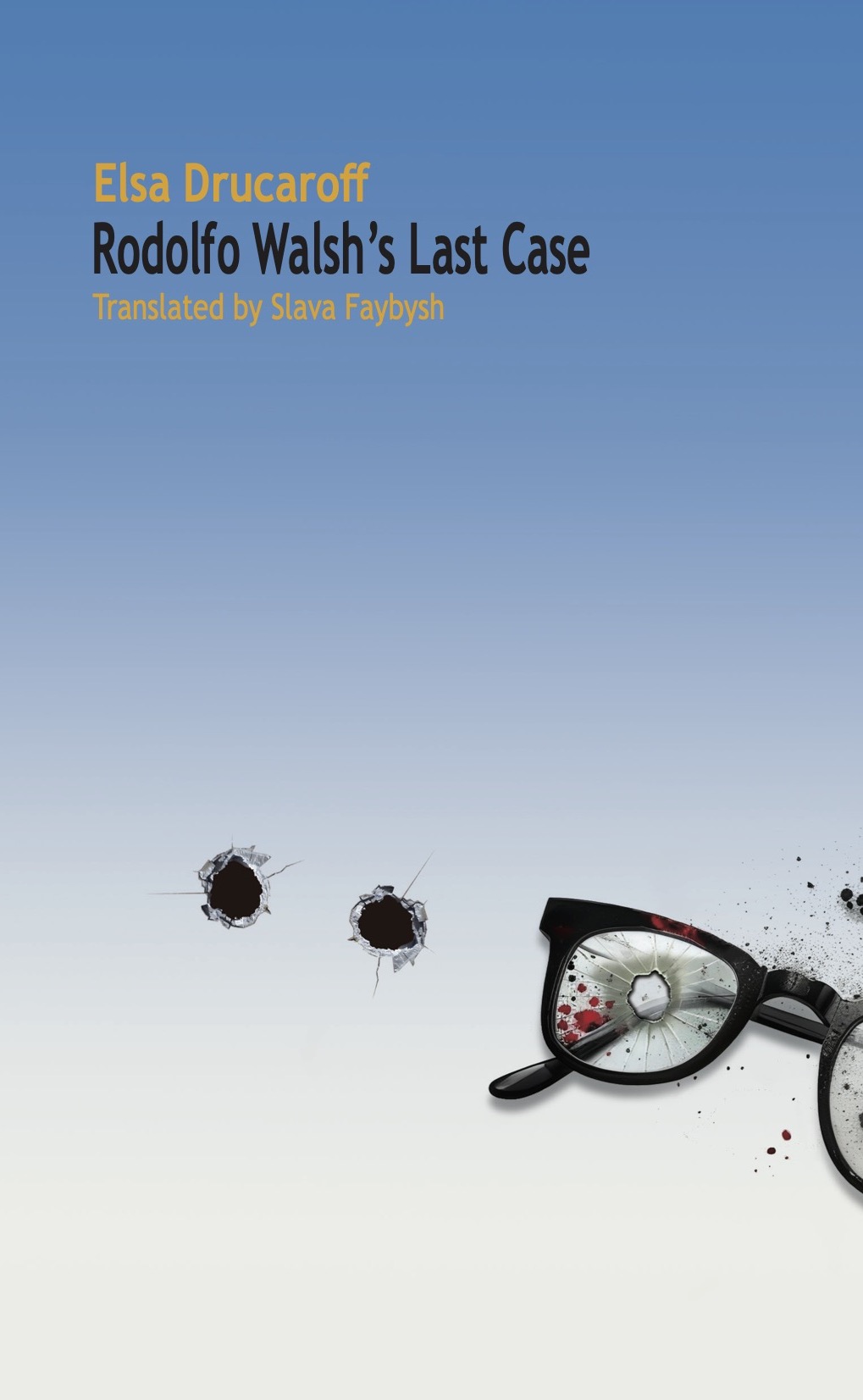United Kingdom: Corylus Books. 2024. 187 pages.
 Rodolfo Walsh’s Last Case by Argentine writer Elsa Drucaroff is finally available in English. As in her previous genre-bending period novels (La patria de las mujeres, Conspiración contra Güemes, El infierno prometido), here too Drucaroff reimagines both history and historical fiction through the lens of a popular genre. Rodolfo Walsh’s Last Case is a “political noir” unfolding during the brutal dictatorship that gripped Argentina from 1976 to 1983. Those who are not acquainted with Drucaroff’s writing will discover an agile, perceptive storyteller with a feline eye for the subtlest movement and an absolute ear for the nuances of speech. Rodolfo Walsh’s Last Case is a propulsive, tightly built thriller, delivered with cinematic punch. Slava Faybysh’s impeccable English rendition seamlessly captures the texture of Drucaroff’s pristine prose, as well as the particular flavor of the Argentinian dialect of the seventies; a bygone world of street corner payphones, foldable maps, and long-hair rock-and-rollers.
Rodolfo Walsh’s Last Case by Argentine writer Elsa Drucaroff is finally available in English. As in her previous genre-bending period novels (La patria de las mujeres, Conspiración contra Güemes, El infierno prometido), here too Drucaroff reimagines both history and historical fiction through the lens of a popular genre. Rodolfo Walsh’s Last Case is a “political noir” unfolding during the brutal dictatorship that gripped Argentina from 1976 to 1983. Those who are not acquainted with Drucaroff’s writing will discover an agile, perceptive storyteller with a feline eye for the subtlest movement and an absolute ear for the nuances of speech. Rodolfo Walsh’s Last Case is a propulsive, tightly built thriller, delivered with cinematic punch. Slava Faybysh’s impeccable English rendition seamlessly captures the texture of Drucaroff’s pristine prose, as well as the particular flavor of the Argentinian dialect of the seventies; a bygone world of street corner payphones, foldable maps, and long-hair rock-and-rollers.
The novel, originally published as El último caso de Rodolfo Walsh in 2010, recasts mythical writer, journalist, and militant Rodolfo Walsh as a detective in search of his daughter María Victoria, left unaccounted-for as a result of a military operation. The novel paints a vivid picture of the asphyxiating state of affairs that defined this traumatic period in Argentina’s memory. And, as if the stakes could not be higher, Walsh becomes entangled in a web of political intrigues against the backdrop of a showdown between the clandestine forces of the army and the guerilla resistance.
Inspired by Rodolfo Walsh’s own writings, the novel can also be read as a postmodern tangle of intertextual allusions. When Walsh’s partner Lila tries to help him with the case, she resorts not to facts or reasoning but to a literary reference: “If this were one of your detective stories, and only one sandal turned up, what would that mean?” Walsh replies: “[…] this isn’t an English crime novel, Lila. This is reality.” In a game of literary winks and self-reflexive nods, Drucaroff extracts elements from Rodolfo Walsh’s “Letter to My Friend,” “That Woman,” and Operation Massacre to construct this polyphonic work of crime fiction, which casts Walsh himself—an investigator of political crimes and writer of detective stories—as an archetypical yet multifaceted fictional sleuth.
“As the quintessential writer committed to the struggle of social justice, Rodolfo Walsh had a definite answer to the age-old question regarding the effectiveness or the value of literature as a tool of resistance”
This imagined Walsh is as complex and psychologically dense as the historical figure. But, more significantly, Drucaroff creates a kaleidoscopic mosaic of broken mirrors where all characters—spouses, spies, double-spies, and counter-agents—reflect their contradictions and fractured identities. There is not just a battle taking place inside the nation; there are also personal, inner struggles. Every character has been called upon to perform a heroic act destined for failure: reconstructing their identity emerges as the most conspicuous of them all. For that reason, one of the nagging questions—the actual case underpinning this novel—is how to reconstruct an identity in a shattered society that feels degraded beyond salvation. It is in this sense that Rodolfo Walsh’s Last Case is also a timely novel, as Argentina is once again (in 2024) besieged by a reactionary government casually flirting with economic misery and militarized repression.
As the quintessential writer committed to the struggle of social justice, Rodolfo Walsh had a definite answer to the age-old question regarding the effectiveness or the value of literature as a tool of resistance. According to him, politics trump literature. At some point in the novel, Walsh (the character) makes it clear that, even if someone values his detective stories as “little gems,” they are worthless in the face of social injustice: “I shit on little gems if they ignore the dispossessed.” On March 25, 1977, as Walsh lay agonizing on the sidewalk of San Juan Avenue after having been ambushed and shot by a fifty-troop death squad, he most probably did not change his mind. Rodolfo Walsh’s Last Case is a celebration of this principled and single-minded commitment. But, at the same time, after turning the last page of this novel, one has the lingering feeling that resistance could suddenly be imbued with poetry and that literature can turn out to be political in the broadest metaphysical sense.





